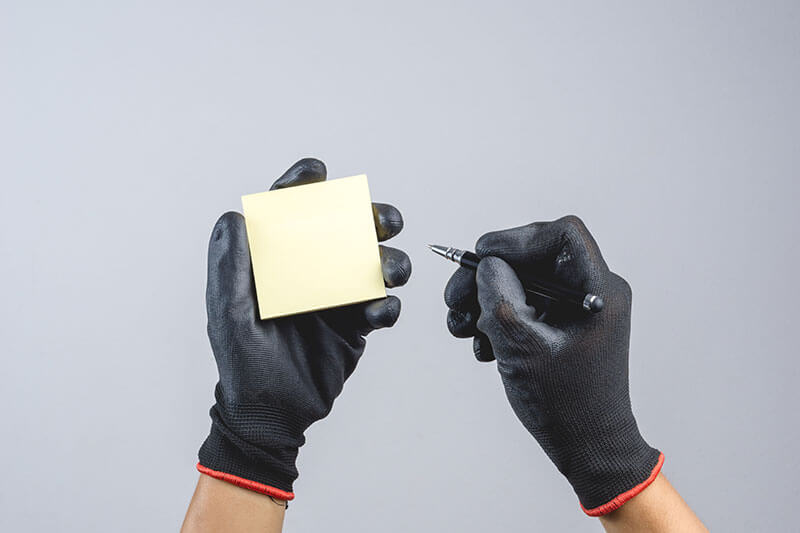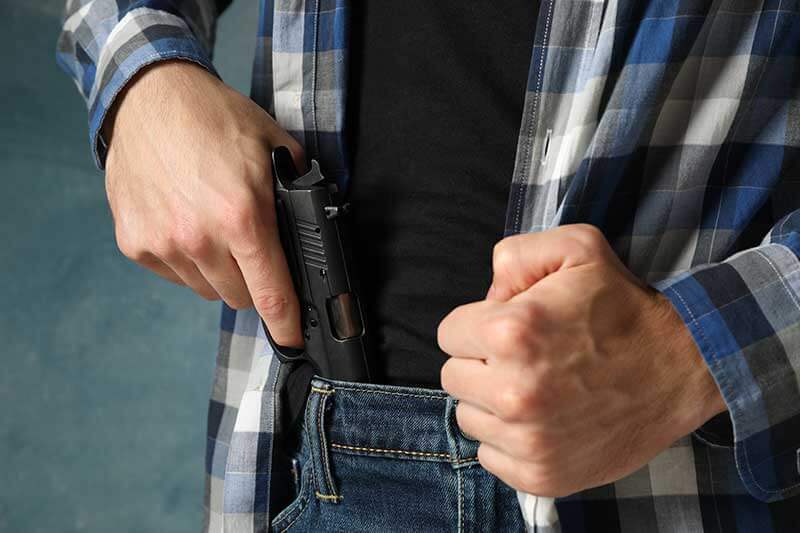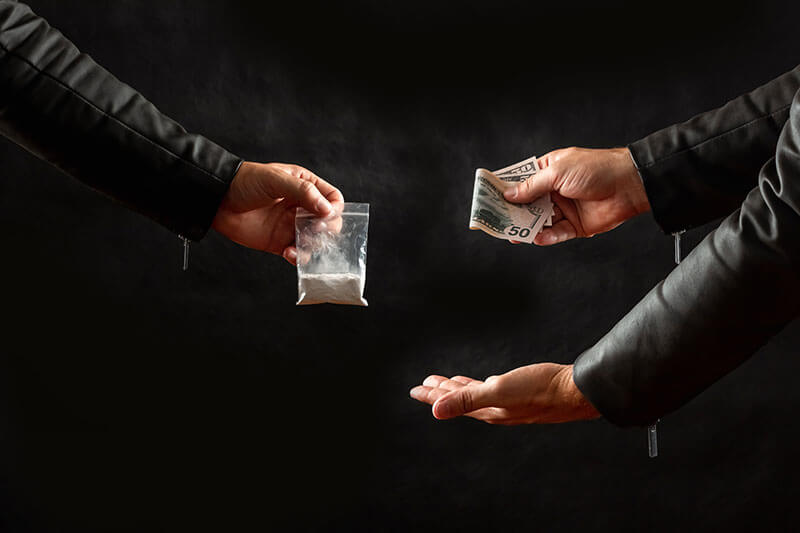In California, If you are an immigrant, you have surely wondered if you can you carry a concealed weapon. This is regulated by several laws, which may require meeting certain legal criteria.
Therefore, our Los Angeles criminal defense lawyers at Lluis Law can provide you with the guidance necessary to understand and comply with these legal complexities.
LATINOS WITH OVER 50 YEARS EXPERIENCE
Tell Us Your Case
Table of Contents
Can you carry a concealed weapon in 2025 in the state of California?
In California, carrying a concealed weapon in public requires a carry concealed weapons (CCW) license.
Since the Supreme Court’s decision in New York Rifle and Pistol Association v. Bruen, California is a “mandatory issue” state. This means that licenses can only be issued by the county sheriff’s office or local police station.
Note: Obtaining one of these licenses requires a strict process that may include restrictions on its use. Additionally, out-of-state licenses are not recognized in California.
Do I need to declare possession of a firearm?
To begin with, yes. In California, “a personal importer of firearms” is considered to be anyone who:
- Has not previously declared possession of a firearm; or
- Travels to the state with one.
These individuals must report their weapon to the Department of Justice (DOJ) or, alternatively, sell or transfer it through a licensed dealer or law enforcement agency.
DOJ conducts background checks and maintains buyer and seller records on all intrastate gun transfers.

Key aspects of gun laws in California
California has strict regulations regarding the carrying and use of weapons that must be strictly enforced. These are:
- Tasers and stun guns: These are legal for people over 19 with no criminal record. However, their use is prohibited in schools, airports and government buildings.
- Pepper spray: Devices with up to 2.5 ounces are permitted for self-defense. However, their use is restricted to minors and people with criminal records.
- High-capacity magazines: Possession of magazines with more than 10 rounds is prohibited, with penalties that may include fines or prison sentences.
- Ammunition: Purchase requires a background check. Additionally, armor-piercing ammunition and .50 BMG are prohibited.
- Concealed weapons license: A concealed weapons license is required, with a minimum age of 21 years old to be able to apply.
Training Requirements for California Concealed Weapon Licenses
The course must include at least 16 hours of training in firearms handling, safety and technique, with field shooting exercises and demonstrations of proficiency with each requested weapon.
The issuing authority may require a course of up to 16 hours or a community college certificate program of up to 24 hours, and may require annual qualification with authorized weapons.
For renewals, an 8-hour course covering firearms safety and laws is required.
Who can sell a gun in Los Angeles, California?
In California, firearms can only be sold through authorized dealers. Therefore, in order to purchase a firearm, it is mandatory to:
- Have a purchase permit;
- Submit to a background check; and
- Notify the transaction to the DOJ.
It should be noted that selling, lending or transferring weapons to minors is prohibited. In addition, the purchase of ammunition requires an eligibility verification at the point of sale, for which the consumer must pay $1.
What should I know about the process of purchasing a Firearm in California?
To purchase a gun in California, you must:
- Do it through an authorized dealer (FFL);
- Submit a valid identification;
- Proof of residency; and
- A Firearms Safety Certificate (FSC), unless specifically exempted.
In addition to this, you must complete ATF Form 4473 and state DROS. There is also a mandatory 10-day waiting period before the gun can be picked up.
Note: You are only allowed to purchase one pistol or semi-automatic rifle every 30 days, although there are exceptions.
How difficult is it to get a concealed carry permit in California?
Obtaining a concealed carry permit in California can be very difficult, especially in places like Los Angeles and San Francisco.
This is because permits are usually granted mainly to:
- Influential people; or
- Politically connected, such as judges, certain lawyers and reserve police officers.
In these large cities, the local police department or sheriff has complete authority to decide whether or not to grant the permit.
In addition, their decisions can be arbitrary, with no possibility of appeal. On the other hand, in more rural counties, obtaining a license can be more accessible, requiring, for example, no serious criminal record.

Are you looking to clean your criminal record in California ? At Lluis Law, we can help you understand and manage this complex process. Give us a call and we will guide you step by step.
What else should I know about concealed carry licenses in California?
Concealed carry licenses allow concealed firearms to be carried under certain conditions. However, they are only issued to residents, in-state workers, or active military personnel stationed in California.
Modifications and changes
- You can modify your license to add or remove weapons or change restrictions;
- You must notify the sheriff’s CCWL Unit of any change of address within 10 days.
Main requirements
You must meet the following criteria:
- Have good moral character and residence or employment in a California county;
- Have approved firearms training classes;
- No history of violent crimes, domestic violence or recent mental health problems.
Validity and application
The license is valid for two years. We therefore recommend that you contact your local authority for details, costs and applications.
How do you apply for a concealed carry permit in California?
To apply for a permit to carry a concealed weapon in California:
1# Contact the designated officer in your area to confirm the application steps
Because the process in California varies by county or city, you will need to contact the sheriff or police chief in your area to confirm the specific steps for your application.
This process may include a background check and approval before attending a training course.
2# Complete an approved training course
Depending on the issuing authority, this step may be done at the time of submitting the application or later.
3# Take a psychological test (optional)
In some jurisdictions, additional psychological testing may be required.
4# Submit your application for carrying a concealed weapon in California
Please use the online licensing portal to submit your application or download the form and follow the instructions from your licensing authority.
5# Upload the required documents
You can upload the required documents directly to the portal or submit them along with your application to the sheriff or police department. Required documents may include:
- Your training certificate.
- Proof of residency in your county or city.
- Birth certificate, naturalization certificate or valid US passport.
- California driver’s license or identification card.
You may also be required to have an interview and be fingerprinted at the issuing authority’s office or at an authorized location.
6# Wait for notification
Once the background check is complete, you will be notified within 90 days whether your application has been approved or denied. Please note that background check approval times may vary.
The California license may include reasonable restrictions that the issuing authority deems fair, which must be detailed in the license.

Additionally, when carrying a concealed weapon, the license holder must not:
- Consume alcoholic beverages;
- Being in places whose main purpose is to dispense alcoholic beverages;
- Being under the influence of medications or drugs, whether prescribed or not;
- Refusing to show a license or surrender a concealed weapon when requested by a law enforcement officer;
- Obstructing an officer from performing his or her duties;
- Falsely representing himself as an official;
- Unjustifiably displaying a concealed weapon;
- Carrying a weapon that is not included in the permit;
- Carrying a weapon at times or under circumstances other than those specified in the permit.
How do you renew your concealed carry license in California?
To renew your license to carry a concealed weapon in California, follow these steps:
- Check with the issuing authority: It is your responsibility to initiate the renewal process before your license expiration date, usually between 30 and 90 days before expiration.
- Complete the renewal class: Required for renewal of your 8-hour license.
- Perform additional psychological testing: Only if there is evidence to indicate the need for such testing.
- Submit the application: Through the online licensing portal or download the application and follow the instructions of the issuing authority.
- Receive notification: You will be informed if your application has been approved or rejected.
Who is not eligible to apply for a concealed carry License in California?
In California, individuals who:
- Are considered a danger to themselves, others or the community at large;
- Have been convicted of contempt of court;
- Be subject to restraining or protection orders in the past five years;
- Have been convicted of a hate crime, civil offense, or certain misdemeanors within the past ten years;
- Engage in the unlawful or reckless use, display or brandishing of a weapon;
- Are charged with a felony, misdemeanor sex offense, or misdemeanor weapons offense dismissed following a guilty plea within the past ten years;
- Have been committed or incarcerated for a controlled substance offense, or are under community supervision or probation;
- Are currently abusing controlled substances;
- Have lost or had multiple weapons stolen due to their failure to comply with the law;
- They have not reported the loss of a weapon in accordance with the law.

Are you facing charges for possession for sale of a controlled substance or manufacturing of a controlled substance in California ? Call us
What happens if I get caught carrying a concealed weapon without a license in California?
If a person is caught carrying a concealed weapon without a valid license in California, they could face misdemeanor charges.
These charges can carry up to one year in county jail and/or fines of up to $1,000.
Under specific circumstances, carrying a concealed weapon without a license could be classified as a felony. This includes a prior felony conviction, knowledge of a stolen firearm, gang affiliation, or a legal prohibition on possessing firearms.
Note: In certain cases, penalties could increase to up to three years in prison and/or fines of up to $10,000.
Are there laws regarding carrying assault rifles in California?
State law prohibits certain assault weapons based on their type, specific model, and general characteristics. These are:
Category 1: Prohibition by type, series and model
California bans assault weapons identified by name. For example:
- Beretta AR-70;
- Springfield Armory BM59;
- SAR-48;
- Sterling MK-6; and
- Bushmaster rifle.
Category 2: AK and AR-15 model variants
Any weapon that is a copy or variant of the AK-47 or AR-15 rifles, even with minor differences, is also prohibited. For example, similar models that only change minor details.
Category 3: Prohibition due to general characteristics
Penal Code § 30515 states that assault weapons are any weapons that have certain specific characteristics:
Rifles
- Centerfire semi-automatic rifles without a magazine well that includes certain features such as a thumbhole stock or flash suppressor;
- Semi-automatic rifles with fixed magazines of more than 10 rounds;
- Semi-automatic rifles with an overall length of less than 30 inches.
Pistols
- Semi-automatic pistols without a fixed magazine that include a threaded barrel, second grip and other features;
- Semi-automatic pistols with fixed magazines that hold more than 10 bullets.
Shotguns
- Semi-automatic shotguns with folding stock, visible pistol grip, thumbhole stock, or vertical grip;
- Semi-automatic shotguns without fixed magazine;
- Shotguns with rotating cylinder.
Other firearms
- Semi-automatic weapons other than rifles, pistols or shotguns, without a fixed magazine and with certain characteristics;
- Weapons with fixed magazines of more than 10 bullets;
- Weapons with an overall length less than 30 inches.
FAQs about whether you can carry a concealed weapon in California

Can you carry a concealed weapon while hunting with a shotgun or rifle in California?
No, in California, you are not allowed to carry a concealed weapon while hunting with a shotgun or rifle.
However, licensed hunters are allowed to carry concealed pistols, revolvers or other weapons. They must be unloaded and transported in the trunk of the vehicle or in a locked container outside the utility compartment or glove box.
What do California’s knife laws say about carrying knives?
In California, fixed blade knives must be carried openly, except for knives classified as dirks or daggers, which must be carried openly.
Pocket knives with blades less than 2 inches can be carried concealed. Switchblades with blades longer than 2 inches are illegal. The following weapons are also illegal:
- Ballistic knives;
- Cane swords;
- Sabers;
- Blackjacks;
- Sandbags;
- Sand sticks;
- Hondas; and
- Nunchucks.
Where in California is concealed carry prohibited?
In California, carrying concealed firearms is restricted in several places, even with a license. This includes hospitals, public transportation, parking areas, etc.
They are also prohibited in polling places, schools, government buildings and other specific locations established by state and local law.
However, there are certain exceptions that apply to persons authorized by law. For example, law enforcement officers and certain licensed hunters while on their way to or returning from a hunting expedition.
What should I not do if I have a license to carry a concealed weapon in California?
California has implemented a law that restricts certain conduct by license holders when carrying a firearm. These are:
- Consume alcohol or controlled substances;
- Enter bars;
- Being under the influence of alcohol, medications or controlled substances;
- Carrying a weapon that is not registered on your license or that is not your registered property;
- Pretending to be a law enforcement agent;
- Unjustifiably displaying a deadly weapon;
- Not carrying the license with you;
- Interfering with the work of a police officer;
- Refusing to produce the license or weapon for inspection at the request of a law enforcement officer;
- Violate federal, state or local criminal laws.
Note: The California license must detail the authorized weapon, including the manufacturer, serial number and caliber. In addition, it must include personal information about the holder such as name, address, date of birth, physical description, fingerprints, photo, etc.
Can I travel to another state with a concealed weapon License?
No, California does not have reciprocity with other states to recognize concealed carry firearm permits.
Some states may recognize the California firearms license, but others may not require a permit to carry a concealed firearm.
Therefore, it is advisable to check local laws in each state before traveling with a gun. In addition, Transportation Security Administration (TSA) regulations and airline policies regarding the transportation of firearms and ammunition are strict.
How can a lawyer help you apply for a concealed carry License in California?
Criminal defense attorneys David and Ramiro of Lluis Law have over 50 years of combined experience handling complex legal cases in California.
As a result, their deep knowledge and understanding of firearm carrying laws and procedures allows them to offer solid, personalized guidance to help applicants navigate the process of obtaining a permit to carry a concealed weapon.
Whether evaluating eligibility, gathering the necessary documentation, or preparing the application, the attorneys at Lluis Law provide expert support that ensures every step is completed. Call us today.
LATINOS WITH OVER 50 YEARS EXPERIENCE
Tell Us Your Case



